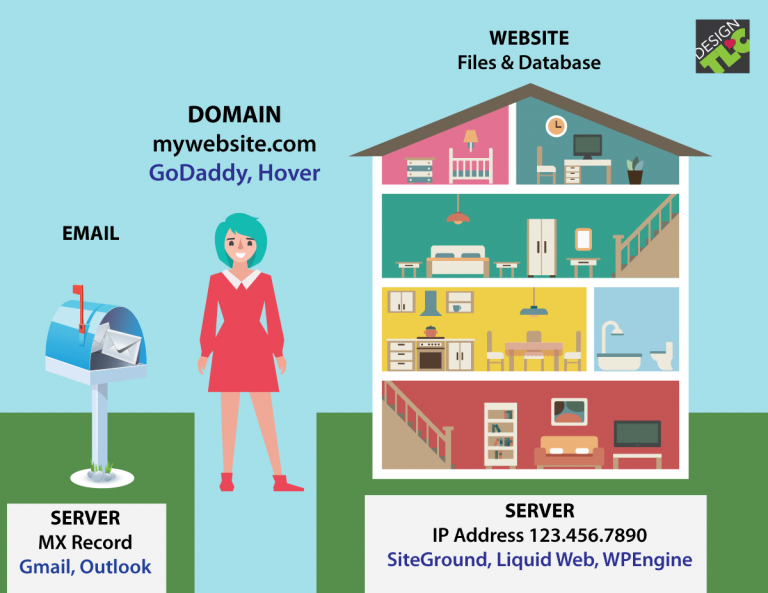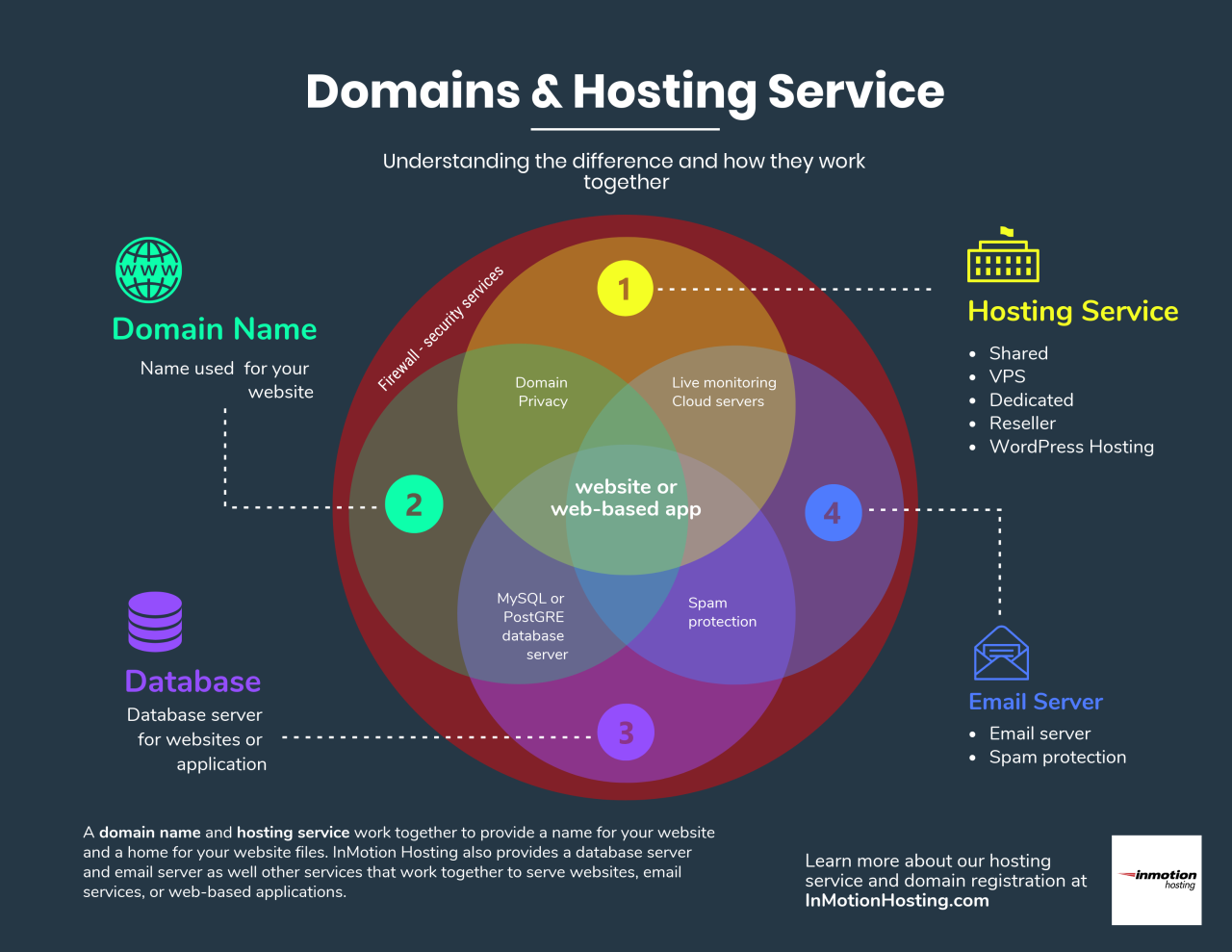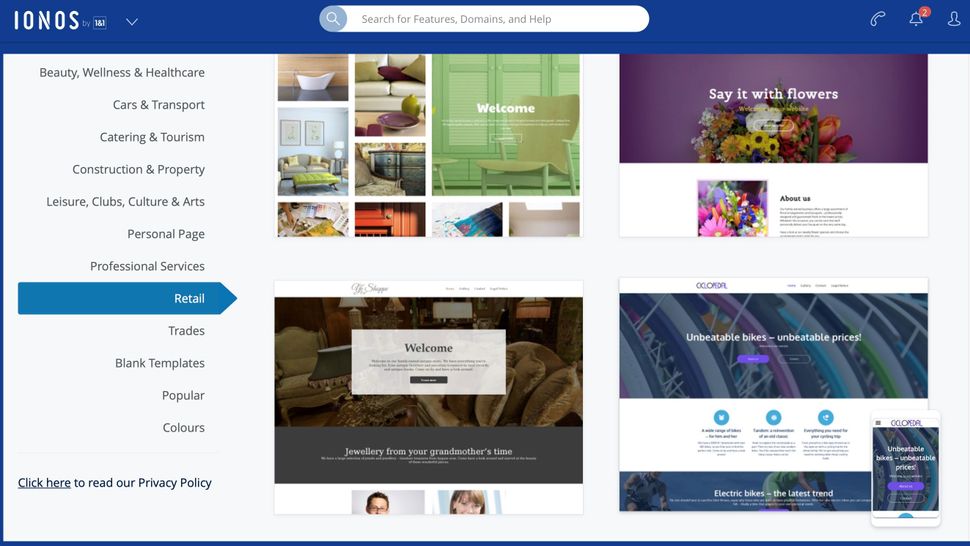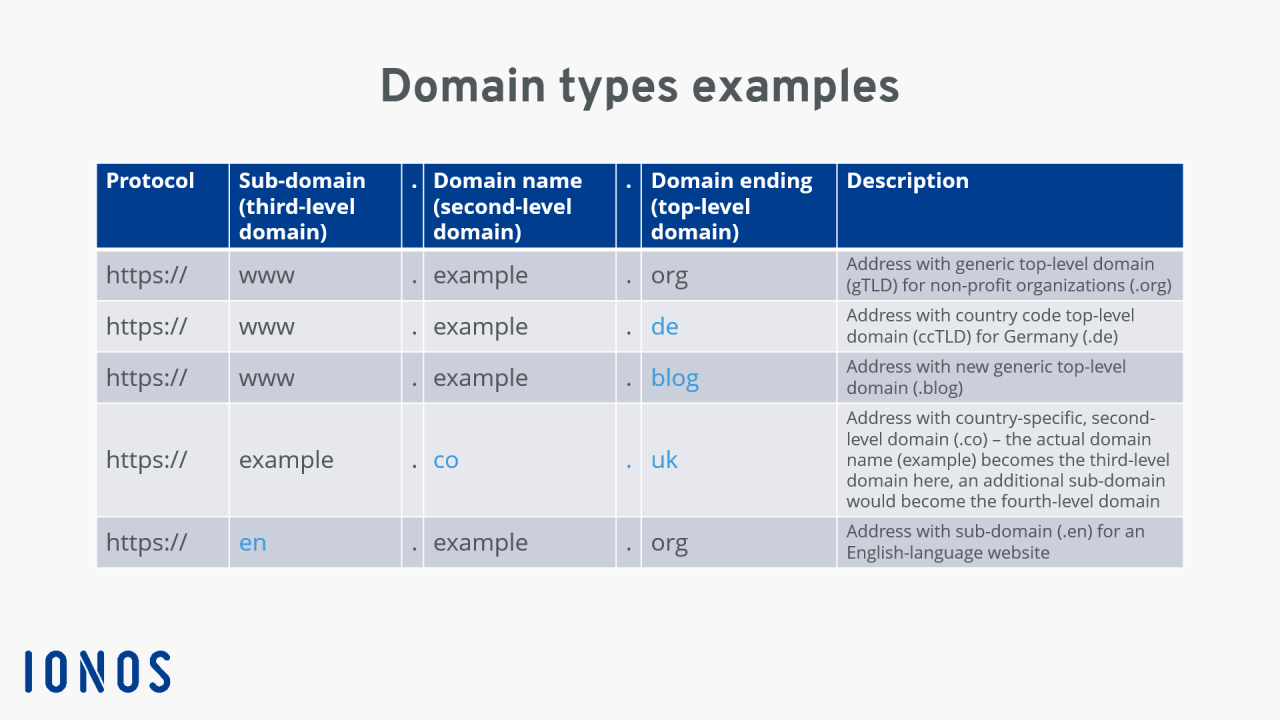Web hosting and domain names are the foundation of any online presence. They are the digital address and the physical space where your website resides, respectively. Just like a physical address guides visitors to your home, a domain name directs users to your website. And just as your home needs a physical structure to accommodate its occupants, your website requires web hosting to store its files and make it accessible to the world.
This guide explores the intricacies of web hosting and domain names, demystifying their complexities and empowering you to make informed decisions. We will delve into the different types of hosting services, the importance of choosing the right domain name, and the essential features that contribute to a successful online presence. Whether you are a seasoned entrepreneur or a budding blogger, this comprehensive overview will equip you with the knowledge and tools to navigate the world of web hosting and domain management with confidence.
Understanding Web Hosting and Domain Names
Imagine you have a beautiful house, but no address for people to find it. That’s like having a website without a domain name and web hosting. Web hosting and domain names are essential for making your website accessible to the world.
Domain Names: Your Website’s Address
A domain name is your website’s unique address on the internet. It’s the human-readable part of a website’s URL, like “example.com”. Think of it as your website’s name tag.
“A domain name is the address of your website on the internet.”
When someone types your domain name into their web browser, it directs them to your website’s content.
Web Hosting: The Foundation for Your Website
Web hosting is the service that provides the physical space and resources for your website to exist on the internet. It’s like renting a physical space for your website’s files, images, and other content.
“Web hosting is the service that provides the physical space and resources for your website to exist on the internet.”
Without web hosting, your website’s content would have nowhere to reside, and people wouldn’t be able to access it.
The Relationship Between Web Hosting and Domain Names
Think of a domain name as your website’s street address and web hosting as the house itself. You need both to have a functional website.
– Your domain name directs visitors to your website.
– Web hosting provides the physical space and resources to store your website’s content.
– When you register a domain name, you must also choose a web hosting provider to store your website’s files.
Types of Web Hosting Services
There are several different types of web hosting services, each with its own advantages and disadvantages.
– Shared hosting is the most affordable option, where multiple websites share the same server resources. It’s suitable for small websites with low traffic.
– VPS hosting offers more resources and control than shared hosting, with a dedicated portion of a server. It’s suitable for websites with moderate traffic and those requiring more control over their server environment.
– Dedicated hosting provides an entire server dedicated to your website. It offers the highest level of performance, security, and control, but it’s the most expensive option. It’s suitable for high-traffic websites, demanding applications, and businesses with strict security requirements.
– Cloud hosting distributes your website across multiple servers, offering scalability, flexibility, and high availability. It’s suitable for websites with fluctuating traffic, businesses that need to scale their infrastructure quickly, and those prioritizing reliability.
Choosing the Right Domain Name
Selecting the right domain name is crucial for your website’s success. It should be:
– Memorable and easy to spell: People should be able to remember and type it easily.
– Relevant to your website’s content: It should reflect what your website is about.
– Available: Make sure the domain name is not already taken.
– Short and catchy: A shorter domain name is easier to remember and type.
– Brandable: It should be something that you can build a brand around.
Types of Web Hosting Services
Choosing the right web hosting service is crucial for your website’s performance, security, and scalability. Understanding the different types of web hosting available can help you make an informed decision that aligns with your website’s needs and budget.
Shared Hosting
Shared hosting is the most affordable option, where multiple websites share the same server resources. This means that your website’s performance can be affected by the activity of other websites on the same server.
- Advantages: Shared hosting is the most budget-friendly option, making it ideal for personal websites, blogs, or small businesses with low traffic volumes. It’s also easy to set up and manage, with most hosting providers offering user-friendly control panels.
- Disadvantages: Shared hosting offers limited resources and control, potentially leading to slow loading times or downtime if other websites on the server experience heavy traffic. It’s also less secure, as any vulnerability on one website can affect others on the same server.
- Real-world Examples: Shared hosting is suitable for personal blogs, small business websites, and simple online portfolios with low traffic volumes. For instance, a hobbyist blogger starting a personal blog with minimal traffic would find shared hosting cost-effective and easy to manage.
VPS Hosting
VPS hosting provides a virtualized server environment, offering more resources and control than shared hosting. You get a dedicated portion of the server’s resources, providing better performance and security.
- Advantages: VPS hosting offers improved performance and security compared to shared hosting, with dedicated resources and root access for greater control. It’s also more scalable, allowing you to upgrade your resources as your website’s needs grow.
- Disadvantages: VPS hosting is more expensive than shared hosting and requires a slightly higher level of technical expertise for management.
- Real-world Examples: VPS hosting is ideal for growing businesses with moderate traffic volumes or websites with specific software requirements. For example, an e-commerce store with increasing traffic and sales would benefit from the enhanced performance and security of VPS hosting.
Dedicated Hosting
Dedicated hosting provides you with an entire physical server exclusively for your website. This offers the highest level of performance, security, and control, but comes at a higher price.
- Advantages: Dedicated hosting provides maximum performance, security, and control, with dedicated resources and full root access. It’s ideal for high-traffic websites, demanding applications, or businesses requiring the highest level of security.
- Disadvantages: Dedicated hosting is the most expensive option and requires advanced technical expertise for management. It’s also less scalable, as upgrading resources usually involves acquiring a new server.
- Real-world Examples: Dedicated hosting is suitable for high-traffic websites, online gaming platforms, or businesses with critical data requiring maximum security. For instance, a large online retailer handling thousands of transactions daily would need the performance and security of dedicated hosting.
Cloud Hosting
Cloud hosting distributes your website across multiple servers in a data center, offering high scalability, reliability, and flexibility. It’s a popular choice for businesses that need to handle fluctuating traffic volumes or require high availability.
- Advantages: Cloud hosting offers high scalability, reliability, and flexibility, with resources dynamically allocated based on your website’s needs. It’s also highly secure and cost-effective for long-term use.
- Disadvantages: Cloud hosting can be more complex to manage than other hosting types, and the pricing structure can be more complex, especially for businesses with high traffic volumes.
- Real-world Examples: Cloud hosting is ideal for businesses with fluctuating traffic volumes, high-availability requirements, or websites with complex applications. For example, a SaaS company with a large user base and varying traffic patterns would benefit from the scalability and flexibility of cloud hosting.
Comparison Table
| Hosting Type | Price | Resources | Control | Scalability |
|---|---|---|---|---|
| Shared Hosting | Lowest | Limited | Limited | Limited |
| VPS Hosting | Medium | Dedicated (virtualized) | Moderate | Moderate |
| Dedicated Hosting | Highest | Full Server | Full Root Access | Limited |
| Cloud Hosting | Variable | Dynamically Allocated | Moderate | High |
Choosing a Domain Name
Your domain name is your online identity, acting as your website’s address on the internet. It’s crucial to choose a domain name that reflects your brand, resonates with your target audience, and is easy to remember.
Domain Name Selection Factors
Choosing a domain name involves considering several factors. These factors are vital for creating a strong online presence and attracting visitors.
- Relevance: Your domain name should be relevant to your website’s content and target audience. For example, if you run a bakery, a domain name like “sweettoothbakery.com” is more relevant than “abc123.com.”
- Availability: Before getting too attached to a name, check its availability. A quick search on a domain registrar’s website will reveal if the domain is taken or available.
- Length: Shorter domain names are generally easier to remember and type. Aim for a name that is concise and memorable, but also descriptive enough to communicate your website’s purpose.
- Memorability: A memorable domain name sticks in people’s minds. Consider using words or phrases that are easy to recall or use alliteration (repeating the same sound at the beginning of words).
Brainstorming Domain Name Ideas
Generating a list of potential domain names requires a brainstorming approach. This process helps you explore different options and discover creative names that align with your brand.
- Research: Identify s related to your website’s niche or industry. Use these s as a starting point for brainstorming domain name ideas.
- Word Combinations: Combine words related to your business or website to create unique domain names. Experiment with different combinations and see what resonates with you.
- Thesaurus Exploration: Use a thesaurus to find synonyms for s related to your website. This can help you uncover alternative domain names that are more descriptive or memorable.
- Rhyming: Try rhyming words or phrases to create catchy domain names. This can be a fun way to come up with unique and memorable options.
Domain Name Registration and Renewal
Once you’ve chosen a domain name, you need to register it. Domain registration involves reserving the domain name for your use, preventing others from using it.
- Domain Registrars: Domain registrars are companies that manage domain name registration. Popular registrars include GoDaddy, Namecheap, and Google Domains.
- Renewal: Domain registrations typically last for one year. You need to renew your domain name before it expires to maintain ownership. Failing to renew your domain name can result in losing your website’s address.
Domain Name Extensions
Domain name extensions, also known as top-level domains (TLDs), are the suffixes that follow the dot (.) in a domain name. Examples include .com, .net, .org, and .info.
- .com: The most popular and widely recognized extension. It’s generally suitable for businesses and commercial websites.
- .net: Originally intended for network-related websites, it’s now used by various websites, including businesses and organizations.
- .org: Typically used by non-profit organizations, charities, and educational institutions.
- .info: Intended for websites providing information, but it’s also used by businesses and individuals.
Web Hosting Features and Services
Choosing the right web hosting plan involves understanding the features and services offered. These features directly impact your website’s performance, security, and overall functionality.
Essential Web Hosting Features
Essential web hosting features are crucial for a website’s functionality and performance. These features ensure your website can handle traffic, store data, and maintain security.
- Bandwidth: Bandwidth refers to the amount of data that can be transferred between your server and visitors’ browsers within a specific timeframe. Higher bandwidth allows for faster loading times and smoother user experiences, especially for websites with high traffic volumes. For example, a website with high-resolution images and videos requires more bandwidth than a simple text-based website.
- Storage: Storage refers to the space allocated on the server for your website files, including images, videos, databases, and other content. Adequate storage ensures your website has enough space to grow and accommodate new content. For instance, an e-commerce website with numerous product images and detailed descriptions requires more storage than a personal blog.
- Email Accounts: Web hosting typically includes email accounts associated with your domain name. These accounts are essential for professional communication, customer support, and managing your website. The number of email accounts included in a hosting plan varies, so choose a plan that meets your needs. For example, a small business might require 5-10 email accounts, while a large corporation might need hundreds.
- Security: Security measures protect your website from threats like malware, hacking attempts, and data breaches. Essential security features include firewalls, malware scanning, and SSL certificates. SSL certificates ensure secure communication between your website and visitors, especially when handling sensitive information like credit card details. For instance, an e-commerce website needs a robust security system to protect customer data.
Website Backups and Data Security
Regular website backups are crucial for disaster recovery and data protection. They allow you to restore your website to a previous state in case of data loss due to technical issues, hacking attempts, or accidental deletions. Data security measures like firewalls, malware scanning, and regular software updates protect your website and user data from unauthorized access.
Website Builders and Content Management Systems
Website builders and content management systems (CMS) simplify website creation and management.
- Website Builders: Website builders offer user-friendly interfaces and drag-and-drop functionalities, allowing you to create websites without coding knowledge. They provide templates and pre-built elements, making website design accessible to everyone. Popular website builders include Wix, Squarespace, and GoDaddy.
- Content Management Systems (CMS): CMS platforms provide a framework for managing website content, including text, images, videos, and more. They offer features like user management, content scheduling, and optimization. Popular CMS platforms include WordPress, Drupal, and Joomla.
Web Hosting Control Panels
Web hosting control panels provide a user-friendly interface for managing your website and server settings. They offer various functionalities, including:
- File Management: Upload, download, and manage website files.
- Database Management: Create, modify, and manage databases.
- Email Account Management: Create, manage, and access email accounts.
- Security Settings: Configure firewalls, malware scanning, and other security measures.
- Website Statistics: Track website traffic, performance, and visitor demographics.
Popular web hosting control panels include cPanel, Plesk, and DirectAdmin. Each panel offers a unique set of features and functionalities, catering to different user needs and preferences.
Website Performance and Optimization
Website performance is a critical aspect of any successful online presence. It directly impacts user experience, search engine rankings, and ultimately, your business goals. A fast, responsive, and secure website keeps visitors engaged, promotes conversions, and builds trust. This section explores how web hosting plays a vital role in website performance and delves into strategies for optimizing your website for speed, security, and user satisfaction.
Impact of Web Hosting on Website Performance
The web hosting service you choose significantly influences your website’s performance. Here’s how:
- Speed: Web hosting infrastructure, such as server hardware, network connectivity, and software configurations, directly affect how quickly your website loads. A robust hosting environment ensures efficient processing of website requests, resulting in faster loading times.
- Uptime: Uptime refers to the percentage of time your website is accessible to visitors. Reliable web hosting providers offer high uptime guarantees, minimizing downtime caused by server outages or technical issues. This ensures your website is consistently available to users, regardless of traffic fluctuations.
- Responsiveness: Responsiveness refers to how quickly your website reacts to user interactions, such as clicking on links or submitting forms. A well-configured web hosting environment with sufficient resources can handle user requests efficiently, leading to a smooth and responsive browsing experience.
Optimizing Website Loading Times
Fast loading times are crucial for user engagement and search engine rankings. Here are strategies to improve your website’s speed:
- Optimize Images: Images often contribute significantly to website loading times. Compress images without compromising quality using tools like TinyPNG or Kraken.io. Use appropriate image formats (JPEG for photos, PNG for graphics) and ensure images are responsive to different screen sizes.
- Minify Code: Minify HTML, CSS, and JavaScript code to remove unnecessary spaces and characters, reducing file sizes and improving loading speeds. Online tools like CSS Minifier and HTML Minifier can automate this process.
- Enable Caching: Caching stores website content temporarily on the user’s browser or server, reducing the need to load it from the server every time. This speeds up page loads for returning visitors. Popular caching plugins for WordPress include W3 Total Cache and WP Super Cache.
- Use a Content Delivery Network (CDN): A CDN distributes website content across multiple servers globally, bringing content closer to users and reducing latency. Popular CDNs include Cloudflare, Fastly, and Amazon CloudFront.
- Choose a Fast Hosting Provider: Select a hosting provider with a solid reputation for speed and performance. Look for features like SSD storage, fast processors, and optimized server configurations.
Website Security and Protection
Website security is paramount to protect your data, user information, and online reputation. Here’s how to enhance your website’s security:
- Secure Sockets Layer (SSL): Install an SSL certificate to encrypt communication between your website and visitors, ensuring secure data transmission. Look for hosting providers that offer free SSL certificates.
- Strong Passwords: Use strong and unique passwords for your website and hosting accounts. Avoid using common or easily guessed passwords. Use a password manager to securely store and manage your credentials.
- Regular Updates: Keep your website software (WordPress, plugins, themes) and hosting platform updated regularly to patch security vulnerabilities. Automatic updates are recommended for optimal security.
- Firewall: Implement a firewall to block malicious traffic and prevent unauthorized access to your website. Most hosting providers offer built-in firewalls.
- Malware Scanning: Regularly scan your website for malware and vulnerabilities using security plugins or dedicated security services. Popular WordPress security plugins include Wordfence and Sucuri.
Monitoring Website Performance
Regularly monitoring website performance is essential to identify potential issues and optimize performance over time. Here are tools and techniques:
- Google Analytics: Track website traffic, user behavior, and page loading times. Google Analytics provides valuable insights into user engagement and identifies areas for improvement.
- GTmetrix: Analyze website speed and performance, providing detailed recommendations for optimization. GTmetrix offers free and paid plans.
- Pingdom: Monitor website uptime, response times, and performance. Pingdom provides comprehensive performance reports and alerts for downtime.
- Website Speed Test: Use website speed testing tools like Google PageSpeed Insights or WebPageTest to assess website speed and identify areas for improvement.
Choosing a Web Hosting Provider

Choosing the right web hosting provider is crucial for the success of your website. It’s not just about finding the cheapest option; it’s about finding a provider that meets your specific needs and provides reliable service.
Factors to Consider When Choosing a Web Hosting Provider
When selecting a web hosting provider, several factors play a crucial role in ensuring a smooth and successful online experience. These factors include:
- Reliability: This refers to the uptime of the hosting server, meaning how often your website is available to visitors. Look for providers with a high uptime guarantee, ideally 99.9% or higher.
- Customer Support: A responsive and helpful customer support team is essential for resolving any technical issues or answering questions. Consider providers offering 24/7 support through multiple channels like live chat, email, and phone.
- Pricing: Hosting plans vary in price depending on features and resources. Compare different plans and choose one that fits your budget while offering sufficient resources for your website’s needs.
- Features: Web hosting providers offer various features like storage space, bandwidth, databases, email accounts, and security features. Choose a plan that includes the features you require for your website.
Comparing Popular Web Hosting Providers
The web hosting market is diverse, with numerous providers catering to different needs and budgets. Here’s a comparison of some popular web hosting providers, highlighting their strengths and weaknesses:
| Provider | Strengths | Weaknesses |
|---|---|---|
| Bluehost | Affordable plans, user-friendly control panel, excellent customer support | Limited storage and bandwidth on entry-level plans |
| HostGator | Reliable performance, generous resources, money-back guarantee | Can be expensive for higher-tier plans |
| GoDaddy | Wide range of hosting plans, extensive domain name services | Customer support can be inconsistent |
| SiteGround | Fast loading speeds, excellent security features, top-notch customer support | More expensive than some other providers |
| DreamHost | Affordable plans, unlimited bandwidth and storage, excellent uptime | Limited features compared to some competitors |
Tips for Researching and Evaluating Potential Web Hosting Providers
To ensure you choose the right web hosting provider, it’s essential to conduct thorough research and evaluation. Here are some tips to guide you:
- Read reviews: Check reputable review websites like HostAdvice and WebHostingTalk to get insights from other users’ experiences with different providers.
- Compare pricing and features: Don’t just focus on the cheapest option. Compare different providers’ plans based on features, resources, and pricing to find the best value for your needs.
- Consider your website’s needs: Think about the traffic your website is expected to receive, the resources it requires, and the features you need. Choose a plan that can accommodate your current and future needs.
- Look for guarantees and support: Check if the provider offers a money-back guarantee and what type of customer support is available (live chat, email, phone). A reliable provider should offer multiple support channels and be available 24/7.
- Ask for recommendations: Reach out to other website owners or developers for their recommendations and experiences with different hosting providers.
Domain Name Management
Your domain name is your online identity, acting as the address for your website. Managing your domain name effectively is crucial for maintaining your online presence and ensuring your website remains accessible to visitors. This involves understanding the process of registering, managing, transferring, and renewing your domain name.
Registering a Domain Name
Registering a domain name is the first step in establishing your online presence. It involves securing a unique name that represents your website. This process typically involves the following steps:
- Choosing a Domain Name: Select a relevant, memorable, and available domain name that aligns with your website’s purpose. Consider using s related to your business or brand to improve search engine visibility.
- Selecting a Domain Registrar: Choose a reputable domain registrar that offers reliable services, competitive pricing, and comprehensive features. Popular registrars include GoDaddy, Namecheap, and Google Domains.
- Checking Availability: Verify if your chosen domain name is available. If it’s taken, consider alternative options or variations.
- Completing the Registration: Provide your personal information, choose a registration period (typically one to ten years), and select a payment method.
- Domain Name Verification: Verify your ownership of the domain name by completing the registration process, often through email confirmation or phone verification.
Managing a Domain Name
Once registered, you need to manage your domain name effectively. This involves various tasks, including:
- Updating Contact Information: Ensure your contact information, such as email address, phone number, and mailing address, is up-to-date to receive important notifications and manage your domain name.
- Setting DNS Records: Configure Domain Name System (DNS) records to direct visitors to your website’s server. These records control how your domain name resolves to the corresponding IP address.
- Managing Domain Privacy: Protect your personal information from public view by enabling domain privacy settings, which mask your contact details from WHOIS databases.
- Enabling Security Features: Implement security measures such as two-factor authentication to safeguard your domain name from unauthorized access.
Domain Name Transfer
Transferring a domain name involves moving it from one registrar to another. This might be necessary to:
- Switch to a Different Registrar: Seek better pricing, features, or customer support.
- Consolidate Domain Management: Manage multiple domains under a single registrar for easier administration.
The transfer process typically involves:
- Unlocking the Domain: Contact your current registrar to unlock the domain name for transfer.
- Obtaining an Authorization Code: Receive an authorization code (EPP code) from your current registrar, which acts as a security measure.
- Initiating the Transfer: Provide the authorization code and your domain name to the new registrar.
- Completing the Transfer: The new registrar will initiate the transfer process, which may take several days to complete.
Domain Name Renewal
Domain names expire after a certain period, typically one to ten years. To keep your domain name active, you need to renew it before its expiration date. Failure to renew may result in the domain name becoming available for registration by others.
Website Development and Deployment: Web Hosting And Domain
Building and deploying a website involves transforming your ideas into a functional online presence. It’s a collaborative process that requires understanding the fundamentals of web development, web hosting, and domain names. This section will delve into the steps involved in bringing your website to life, highlighting the key tools and technologies used.
Website Development Tools and Technologies
Website development tools and technologies are diverse, offering flexibility to cater to various project needs. Popular options include:
- Content Management Systems (CMS): CMS platforms, such as WordPress, Drupal, and Joomla, simplify website creation and management. They provide pre-built templates, plugins, and intuitive interfaces, allowing users with minimal coding experience to build dynamic websites.
- Programming Languages: Languages like HTML, CSS, and JavaScript are fundamental to web development. HTML structures the content, CSS styles the appearance, and JavaScript adds interactivity.
- Frameworks and Libraries: Frameworks like React, Angular, and Vue.js streamline development by providing pre-written components and structures, promoting code reusability and efficiency.
- Integrated Development Environments (IDEs): IDEs, such as Visual Studio Code, Atom, and Sublime Text, offer comprehensive features for coding, debugging, and managing code. They provide syntax highlighting, autocompletion, and debugging tools.
FTP Clients and File Management
FTP clients play a crucial role in transferring website files between your local computer and the web server. They act as intermediaries, facilitating the exchange of files necessary for website deployment. Popular FTP clients include FileZilla, Cyberduck, and WinSCP.
- File Transfer Protocol (FTP): FTP is a protocol used to transfer files between computers. It enables you to upload website files, such as HTML, CSS, images, and scripts, to your web server.
- File Management: FTP clients provide a user-friendly interface for navigating directories, uploading, downloading, and managing files on your web server.
- Security: FTP clients often offer encryption options to protect your data during transfer, ensuring secure communication between your computer and the server.
Website Deployment Process
The deployment process involves transferring your website files to the web server, making your website accessible online.
- Prepare Website Files: Once your website is developed, ensure all necessary files, including HTML, CSS, images, and scripts, are organized in the appropriate directory structure.
- Connect to Web Server: Using an FTP client, connect to your web server using the provided credentials (hostname, username, and password).
- Upload Website Files: Transfer the website files from your local computer to the designated directory on the web server.
- Configure Domain Name: Point your domain name to the web server where your website files are hosted. This step ensures visitors can access your website using the chosen domain name.
- Test and Debug: After deployment, thoroughly test your website to ensure it functions correctly across different browsers and devices.
Website Security and Maintenance
Securing and maintaining your website is crucial for its long-term health and performance.
- Regular Updates: Keep your website software, including CMS, plugins, and themes, up to date to patch security vulnerabilities and ensure optimal performance.
- Strong Passwords: Use strong and unique passwords for your website accounts, including the CMS, FTP client, and hosting provider.
- Security Plugins: Install and configure security plugins to protect your website from malware, spam, and other threats.
- Backups: Regularly back up your website data to prevent data loss in case of server issues or attacks.
- Monitoring: Monitor your website’s performance, traffic, and security using tools like Google Analytics and security scanners.
Web Hosting for Different Needs

Choosing the right web hosting solution is crucial for your website’s success. Different website types have unique requirements, and selecting a hosting provider that aligns with these needs is essential for optimal performance, scalability, and security. This section explores web hosting solutions tailored to specific website types and provides recommendations for suitable hosting providers.
E-commerce Hosting
E-commerce websites require robust hosting solutions that can handle high traffic volumes, secure payment processing, and the storage of large amounts of product data. Dedicated servers or cloud hosting are often recommended for e-commerce websites, as they offer the necessary resources and scalability to support online transactions and ensure a seamless user experience.
- Dedicated servers provide exclusive access to a physical server, guaranteeing high performance and security. They are ideal for businesses with high traffic volumes and demanding applications.
- Cloud hosting offers scalability and flexibility, allowing businesses to adjust their resources based on traffic fluctuations. It is a cost-effective option for businesses with varying traffic needs.
Examples of web hosting providers specializing in e-commerce hosting include:
- Shopify: A popular platform specifically designed for e-commerce websites, offering hosting, payment processing, and marketing tools.
- BigCommerce: A comprehensive e-commerce platform that provides a wide range of features, including built-in tools and marketing automation.
- Magento: An open-source e-commerce platform that offers high flexibility and customization options.
Blog Hosting
Blogs typically require less processing power and storage space compared to e-commerce websites. Shared hosting is a cost-effective option for most blogs, offering a reliable and affordable solution. However, if your blog experiences high traffic volumes or you plan to implement complex features, you may consider upgrading to a VPS or dedicated server.
- Shared hosting is a budget-friendly option that allows multiple websites to share a single server. It is suitable for blogs with moderate traffic volumes.
- VPS hosting provides more resources and control than shared hosting, making it ideal for blogs with higher traffic volumes or complex features.
Examples of web hosting providers that cater to bloggers include:
- Bluehost: A popular web hosting provider that offers affordable shared hosting plans specifically designed for bloggers.
- HostGator: Another popular provider that offers a range of hosting options, including shared, VPS, and dedicated servers.
- WordPress.com: A platform specifically designed for WordPress websites, offering hosting and other features for bloggers.
Portfolio Hosting
Portfolio websites showcase your work and skills, often featuring high-quality images and videos. Choosing a hosting provider that offers reliable performance and sufficient bandwidth is crucial for a smooth user experience. Shared hosting can be a good starting point, but if your portfolio grows or you expect high traffic volumes, consider upgrading to a VPS or dedicated server.
- Shared hosting is a cost-effective option for smaller portfolios with moderate traffic volumes.
- VPS hosting provides more resources and control, ensuring smooth performance even with high traffic volumes or large media files.
Examples of web hosting providers suitable for portfolio websites include:
- Squarespace: A platform that offers easy-to-use website builders and hosting for creating professional portfolio websites.
- Wix: Another platform that provides website building tools and hosting for creating stunning portfolio websites.
- GoDaddy: A well-known web hosting provider that offers a range of hosting options, including shared, VPS, and dedicated servers.
Forum Hosting, Web hosting and domain
Forums require robust hosting solutions that can handle high traffic volumes, user registration, and complex database interactions. Shared hosting is generally not recommended for forums, as they can strain server resources. Instead, consider VPS or dedicated servers for better performance and scalability.
- VPS hosting provides dedicated resources and control, making it suitable for forums with moderate to high traffic volumes.
- Dedicated servers offer the highest level of performance and security, ideal for large and active forums with demanding user activity.
Examples of web hosting providers that specialize in forum hosting include:
- InMotion Hosting: A provider that offers a range of hosting options, including VPS and dedicated servers, suitable for forums.
- DreamHost: Another provider that offers reliable VPS and dedicated servers, ideal for hosting forums with high traffic volumes.
- vBulletin: A popular forum software that offers hosting solutions and support for forums of all sizes.
Web Hosting Trends and Future Outlook
The world of web hosting is constantly evolving, driven by advancements in technology and changing user demands. This dynamic landscape is shaping the future of how websites are built, hosted, and accessed.
Emerging Trends in Web Hosting
Emerging trends in web hosting are driven by the need for greater scalability, flexibility, and performance. These trends are transforming the way websites are built and managed.
- Cloud Computing: Cloud computing has revolutionized web hosting by providing a scalable and cost-effective solution. Instead of relying on physical servers, websites are hosted on a network of virtual servers in the cloud. This allows for easy scaling of resources based on demand, reducing infrastructure costs and offering greater flexibility.
- Serverless Architecture: Serverless architecture is a cloud-based approach where the underlying infrastructure is managed by the cloud provider, freeing developers from managing servers. This allows developers to focus on building and deploying applications without worrying about server maintenance. Serverless functions are triggered by events, such as user requests, and are billed based on actual usage, making it a cost-effective solution for applications with varying workloads.
- Edge Computing: Edge computing brings computation and data storage closer to users, reducing latency and improving performance. This is particularly beneficial for applications that require low latency, such as streaming services, online gaming, and real-time data processing. By distributing data and processing power closer to users, edge computing can significantly enhance user experience.
The Future of Web Hosting
The future of web hosting is characterized by increased automation, AI-driven optimization, and a focus on user experience.
- AI-Powered Optimization: Artificial intelligence and machine learning are playing an increasingly important role in web hosting. AI algorithms can analyze website data and traffic patterns to optimize performance, security, and resource allocation. This can lead to faster loading times, improved security, and reduced costs. For example, AI can automatically scale resources based on traffic spikes, preventing server overload and ensuring a smooth user experience.
- Increased Automation: Web hosting is becoming increasingly automated, with tasks such as server management, security updates, and backups being handled automatically. This allows hosting providers to focus on providing better customer support and innovation. For example, automated scaling based on traffic patterns ensures that websites are always available and perform optimally, without requiring manual intervention.
- Focus on User Experience: The future of web hosting is focused on providing a seamless and intuitive user experience. Hosting providers are developing user-friendly control panels and dashboards that make it easy for users to manage their websites. This includes features like one-click installations, automated backups, and easy-to-use security tools. The focus on user experience is also driving the development of new technologies like edge computing, which can significantly improve website performance and reduce latency for users.
The Role of Artificial Intelligence and Machine Learning in Web Hosting
Artificial intelligence and machine learning are transforming web hosting by automating tasks, optimizing performance, and improving security.
- Automated Security: AI-powered security systems can detect and prevent threats in real time, protecting websites from attacks. These systems use machine learning to analyze patterns in traffic and identify malicious activity, such as brute-force attacks and malware infections. AI-powered security can also be used to automatically patch vulnerabilities and update security configurations, ensuring that websites are always protected.
- Performance Optimization: AI algorithms can analyze website data and traffic patterns to identify bottlenecks and optimize performance. For example, AI can automatically adjust server resources based on traffic spikes, ensuring that websites load quickly and efficiently. AI can also optimize content delivery networks (CDNs) to ensure that content is delivered to users from the closest server, reducing latency and improving user experience.
- Predictive Maintenance: AI can analyze server logs and other data to predict potential problems before they occur. This allows hosting providers to proactively address issues, preventing downtime and ensuring website availability. For example, AI can identify patterns in server performance that indicate an impending hardware failure, allowing for preventative maintenance to be scheduled.
The Future of Domain Names
Domain names are the addresses of websites on the internet. The future of domain names is characterized by the rise of new top-level domains (TLDs) and the increasing importance of domain name security.
- New Top-Level Domains: The introduction of new TLDs, such as .shop, .tech, and .app, allows for more specific and relevant domain names. This provides businesses with more options to choose a domain name that reflects their industry or brand. New TLDs can also help to improve website discoverability, as they can be more specific and relevant to search engine algorithms.
- Domain Name Security: As cyberattacks become more sophisticated, domain name security is becoming increasingly important. Hosting providers are implementing measures to protect domain names from hijacking and other attacks. This includes features like two-factor authentication and domain name registration locks. Domain name security is crucial to ensure that websites are accessible and that user data is protected.
Concluding Remarks

Understanding web hosting and domain names is crucial for anyone looking to establish a thriving online presence. From choosing the right hosting service to securing a memorable domain name, every decision you make plays a vital role in your website’s success. By carefully considering your needs and exploring the options available, you can create a robust online foundation that supports your goals and empowers you to connect with your audience effectively.
Web hosting and domain names are the foundation of your online presence. They allow you to create a space for your website and make it accessible to the world. For instance, if you’re building a website for a travel agency, you might need to manage a database using tools like ssms 2019 to ensure smooth operations.
Once your website is up and running, a well-chosen domain name and reliable web hosting will help you attract visitors and build your online brand.




